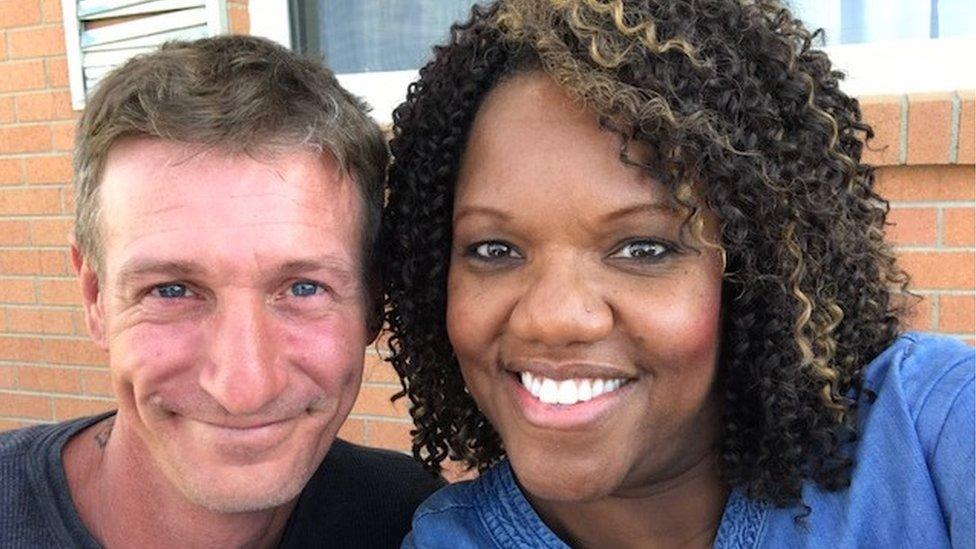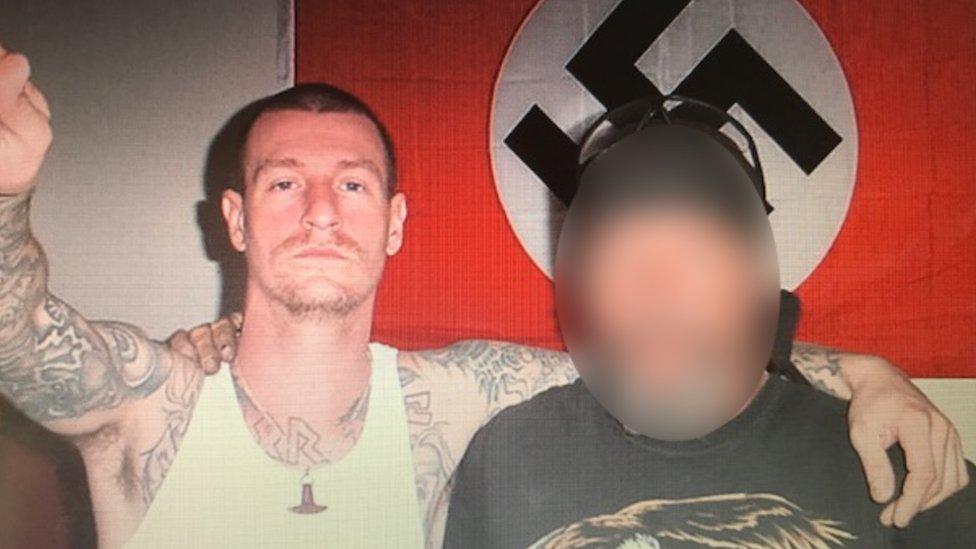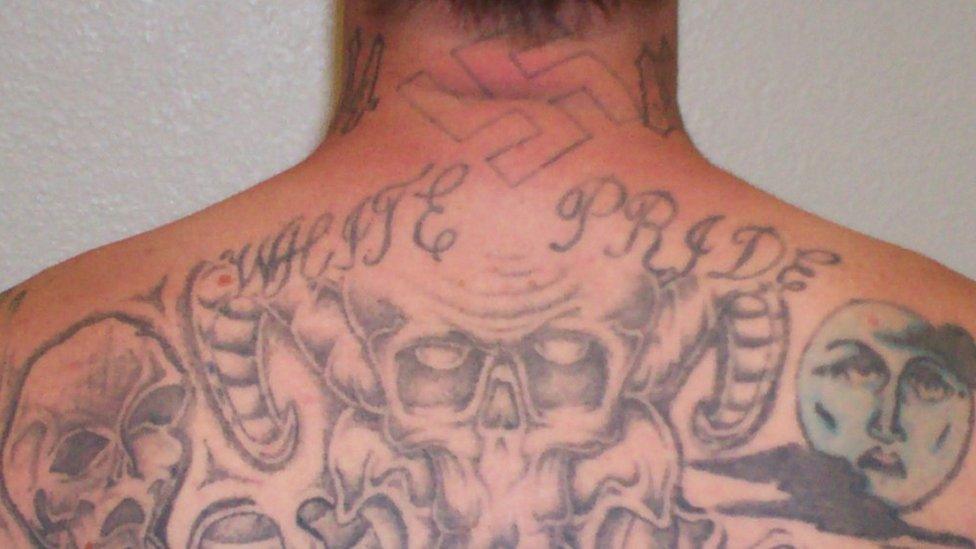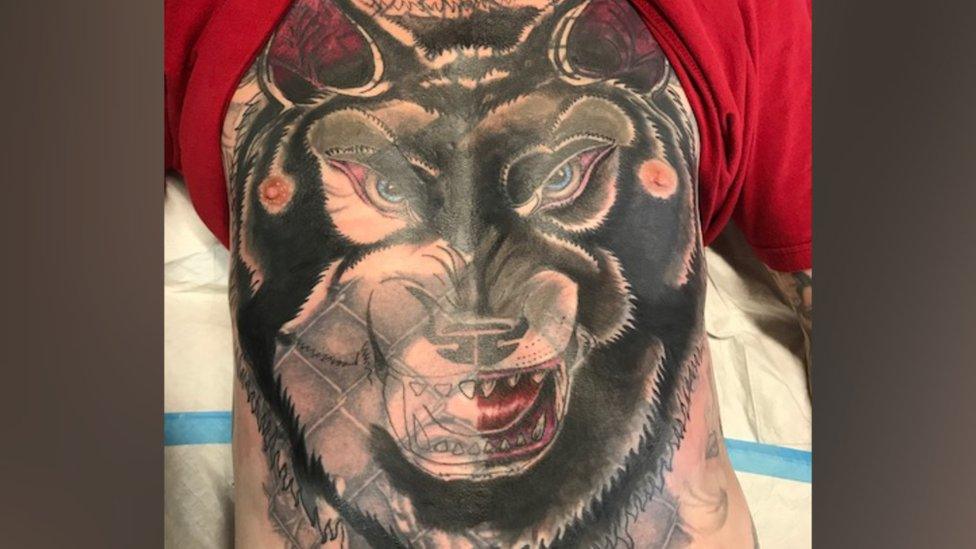'Why I had my Nazi tattoos removed'
- Published

A former neo-Nazi had his swastika tattoos removed after forging an unlikely friendship with his black probation officer. Michael Kent tells the Victoria Derbyshire programme about the relationship that changed his life.
For 20 years, Michael was involved in a violent white supremacist movement in Arizona, committing hate crimes and recruiting young people.
During that time he acquired two swastika tattoos on his chest and a large tattoo of "white pride", a motto used by white supremacists, on his back.
"Every letter I had of the white pride, I had to go on a mission and I had to hurt somebody to gain each letter of that," he says.
'Fuelled hate'
Michael says his neo-Nazi views evolved from racial encounters while growing up in a mostly black neighbourhood, where they had to "fight to survive as a family".
When he was 12, an African-American man broke into his house and tried to rape his mother, and on another occasion, the mother of a black friend said she didn't want "that blue-eyed devil in this house".
"That just fuelled my hate as they didn't like me so you know what, I'm going all out, and I started hating them more than anything," he explains. "Just on how one person treated me, I thought everyone was like that. I became more and more hateful as time went on."

Swastikas and Confederate flags were previously hung in Michael's home
His outlook started to change when he met Tiffany Whittier, who took over his case a year after he completed a prison term for drugs and weapons charges.
She was the first probation officer who had visited him alone, previously they had always come in pairs due to his violent record. She had seen photos of the tattoos in his file, so knew what she was letting herself in for. Michael was impressed.
"That day it sparked something. She had the audacity, the balls, the strength to come to me. From that day on, little by little, she just started transforming my life," he says.
On the next occasion Tiffany went inside his home where she found swastikas, Confederate flags and pictures of Hitler on display. Despite this, she strongly felt she wasn't there to judge him.
"I wanted to get to know him on face value. I just began to speak to Michael, find out where he's from, where his hate stemmed from," she explains.
"I just worked with him, wanted him to be successful on probation and slowly but surely he started to do that on his own. I didn't realise the impact I was having on his own life."

Michael had to "earn" each letter of his tattoo by committing a violent act
She suggested he took down his Nazi paraphernalia, joking that he could replace it with positive influences like smiley faces - but he took it seriously.
Little by little, he got rid of his Nazi stuff and says he started feeling better, less aggressive. Meanwhile, his rapport with Tiffany grew as she supported him, meeting his colleagues and family.
"More and more she became involved in my life and the hate started drifting away and the love started building in my heart," he says. They used to call me "cranky pants" at work, but I began going to work happy and not aggressive," he says.
"As we got to know each other I showed her pictures of what I was like before and she said, 'Oh my God Michael, if I had known what you were like I would never have walked through your gate that day.'"
To complete his transformation, Michael approached an organisation called Redemption Ink, a not-for-profit organisation in the US which removes hate-related tattoos. They referred him to a company in Colorado, where he now lives, which is covering the old pictures with new designs.
"They are turning all this ugliness into something beautiful. I am almost in tears every time," he says.

Michael says having his tattoos removed has been an emotional process
Michael now lives in the mountains, working on a chicken farm where he is the only white person. He has had to move far away from his children because of fear of reprisals from gang members.
The pair now hope to use their story to encourage others to engage with each other more to combat racism. They hope to write a book and will soon be launching a Facebook group "so we can talk about race issues and unite all cultures together to become one".
"I hurt a lot of people, I hurt children by recruiting them when they were young. I went from being a trailer trash racist to a good person," Michael says.
"She's a very courageous woman and I am so glad and very thankful that she's in my life."
Watch the Victoria Derbyshire programme on weekdays between 09:00 and 11:00 on BBC Two and the BBC News Channel.